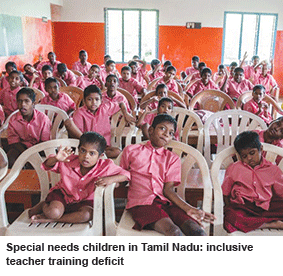Against the backdrop of the invitation of the Union HRD ministry for public involvement with drafting New Education Policy 2015, Dr. Urvashi Sahni gave her recommendations on the 13 ‘themes’ of school education short-listed for public debate .
Even though the historic right to Education Act, 2009 mandates admission of children with special needs in all mainstream schools, this directive is followed more in the breach than observance. “The government school system is a disaster. There are not enough schools in remote areas and habitations with high SC/ST and minority populations. The RTE Act should be amended to penalise schools for denying admission to special needs and SC/ST children. Special needs education should be included in B.Ed and all other teacher training curricula,” says Urvashi Sahni, founder of the Study Hall Educational Foundation, Lucknow, which runs a rural school (Vidyasthali) serving 472 students from 55 villages, and the all-girls Prerna with an enrolment of 730 girls from urban slums.
 EW Recommendation. Ab initio, Education World has argued for inclusive education i.e, integration of children with special needs into mainstream schools, provision of ramps and other enabling facilities in all education institutions (see EW, April 2003) and gender parity in education (EW, April 2004). For inclusive education to become a reality in India, make all school premises disabled-friendly, and update teaching and learning systems and assessment and examinations processes. EW also recommends adoption of the inclusive education model developed by the Mumbai-based National Resource Centre for Inclusion, and multiplying and modernisng of Kasturba Gandhi Balika Vidyalayas, all-girls residential schools in rural India (see EW, September 2007).
EW Recommendation. Ab initio, Education World has argued for inclusive education i.e, integration of children with special needs into mainstream schools, provision of ramps and other enabling facilities in all education institutions (see EW, April 2003) and gender parity in education (EW, April 2004). For inclusive education to become a reality in India, make all school premises disabled-friendly, and update teaching and learning systems and assessment and examinations processes. EW also recommends adoption of the inclusive education model developed by the Mumbai-based National Resource Centre for Inclusion, and multiplying and modernisng of Kasturba Gandhi Balika Vidyalayas, all-girls residential schools in rural India (see EW, September 2007).
Courtesy Education World Online
 DONATE
DONATE


 Volunteer
Volunteer
 Work With Us
Work With Us
